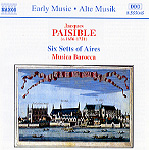Jacques Paisible (c. 1656-1721) seems to have had a real influence on musical life in London, even though his name is long forgotten. He spent about 40 years in the city and was a prolific composer of music for the theater. His main reputation as a performer was as a recorder virtuoso, and he published many works for the instrument in various combinations, including the Six Setts of Aires for two Flutes and a Bass performed here. Published in 1720, they provide good evidence for Paisible’s talents both as a player and composer, which turns out to be craftsmanlike and idiomatic, with no virtuoso pretensions.
The English term “Sett” is analogous to the French “Suite”, a form that included various traditional dance movements, and Paisible enhanced his minuets, sarabandes, and gavottes with an occasional rigadoon, march, or “Scotch Aire”, spicing his lyrical melodic lines with an appealing sensuality. This music must have been perfect for theater intervals: it would offend no one, nor would it be too memorable to distract from the next scene.
The five members of Musica Barocca (recorders, viola da gamba, theorbo, harpsichord) all contribute excellent work here, making the most out of Paisible’s pleasing melodies and sturdy, serviceable bass lines. The sound is ideal for these instruments–clear, warm, and detailed, with no dryness or harshness. Recorder enthusiasts will definitely want this, and any fan of Baroque music can confidently check this out at budget price.
































